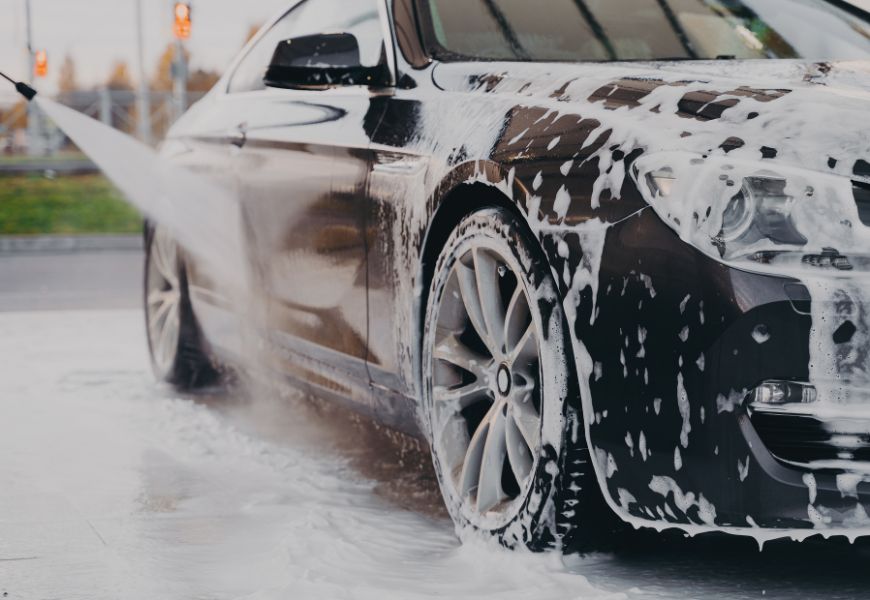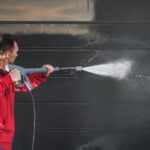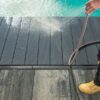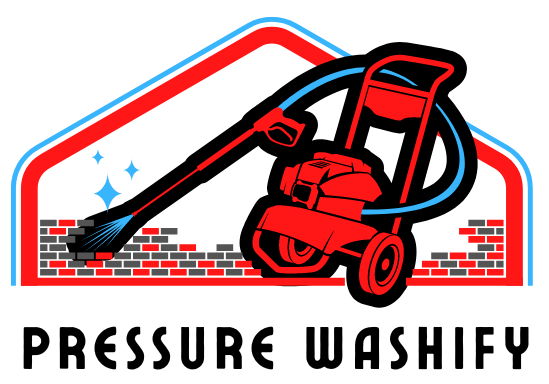Affiliate Disclaimer: This post may contain affiliate links, meaning we get a commission if you decide to make a purchase through our links, at no extra cost to you.
Introduction
Have you ever watched someone blast years of dirt off a driveway with a pressure washer and thought, “Wow, that’s like magic!”? It’s not just the powerful spray doing all the work—there’s also a special ingredient involved. It’s the soap. But not just any soap. When tackling grime with a pressure washer, the type of soap you use can make all the difference between an okay clean and a ‘sparkles-like-new’ cleaning result.
So, what kind of soap to use in a pressure washer? It’s actually a bit of science. Just like you select a specific cleaner for your dishes or laundry, there’s a soap that’s just right for every job your pressure washer might tackle.
Whether it’s your car that needs a shine, your patio that’s crying out for some TLC, or your siding that could use a freshen-up, use soap to elevate your cleaning game to professional levels.
The Difference Between Soap and Detergent

Soap is a natural cleaning agent made from fats or oils mixed with an alkali, such as lye. Soaps have been around for centuries, prized for their ability to break down oils and grime, making the cleaning process easier.
They’re fantastic for many general cleaning tasks and are often preferred for their environmental friendliness. Soaps, however, can struggle with hard water – water that has a high mineral content – as they form a scummy residue that’s tough to rinse away.
Detergent, on the other hand, is a synthetic cleaner specially engineered to perform in a variety of conditions, including hard water. Detergents are made from chemical compounds (surfactants) that are incredibly effective at separating dirt from surfaces.
They can tackle a wide range of cleaning tasks, from lifting stubborn grease stains to combating mold and mildew.
Detergents are generally recommended for tougher, more stubborn stains or when you’re dealing with hard water. Meanwhile, soaps are an excellent choice for everyday cleaning and for those who prefer natural cleaning solutions.
Types of Soap for Pressure Washers
Now that you know soap and detergent are not the same, choosing the right one for your pressure washer can still feel like a puzzle. Let’s make it simple. The soap you pick should match what you’re cleaning. Here are the main types you’ll see on the shelf:
- Biodegradable Soaps: Great for our planet. These soaps break down easily without hurting nature.
- Vehicle Wash Soaps: Made for cars and trucks. They protect your paint and make it shine.
- Household Cleaning Soaps: For your home’s outside, like siding or decks. They’re gentle but effective.
- Heavy-Duty Degreasers: Super strong. Perfect for removing oil and tough dirt from places like driveways.
- Specialty Soaps: These have a special job, like getting rid of graffiti or prepping wood for staining.
Just remember, the soap made for washing your car might not be the best pick for cleaning oil off your garage floor. So, think about what you’re cleaning before you choose your soap.
Homemade Power Washer Solution
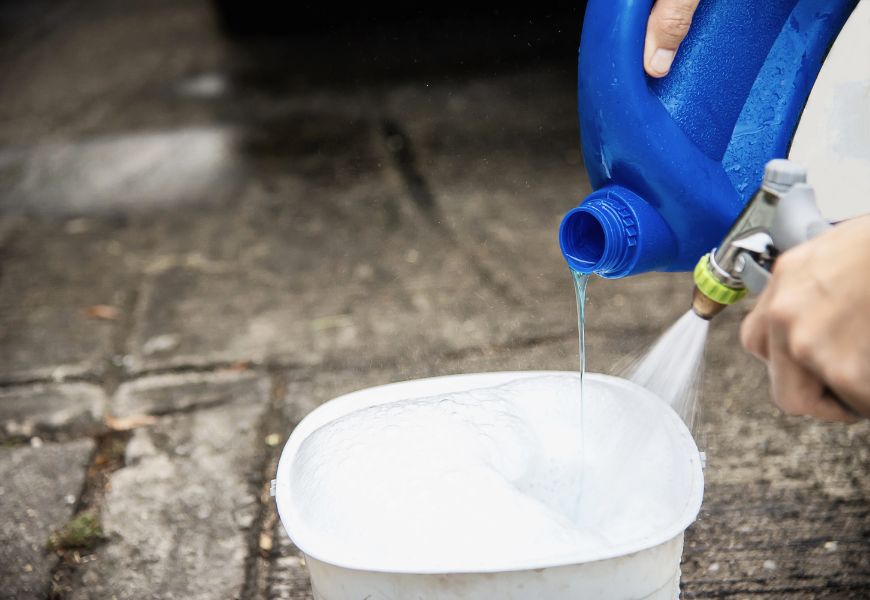
Bought pressure washer soaps or detergents not quite cutting it? Or maybe you’re looking to save a few bucks or prefer a more natural approach? Don’t worry — you can also make your own effective cleaning solution for your pressure washer at home. Let’s go through an easy recipe for a DIY homemade soap, perfect for pressure washing:
Ingredients:
- 1 Gallon of Water
- 1/3 Cup of Laundry Detergent
- 2/3 Cup of Cleaner (like TSP – Trisodium Phosphate)
Instructions:
- Mix the laundry detergent and cleaner in a bucket with a gallon of water.
- Stir the mixture until it’s well blended.
- Add this solution to your pressure washer’s soap dispenser, and you’re ready to go!
Do keep in mind, though, that while DIY soaps are great for many jobs, they might not be the best for every task. For example, cleaning tough oil stains or algae may require a more potent solution, such as a Sodium Hypochlorite (SH) based cleaner.
Can you use dish soap in power washer?
It’s not recommended to use dish soap like ‘Dawn’ in a power washer as it can damage the machine’s internal parts and produce too much foam for practical use. Stick to detergents specifically designed for pressure washers to ensure safety and efficiency.
Sodium Hypochlorite (SH) Solution for Pressure Washing
Sodium Hypochlorite (SH), better known as bleach, can be a pressure washer’s best friend when it comes to dealing with stubborn stains, mold, or algae. An SH solution can power through tough grime and give your surfaces a fresh, clean look.
Precautions for Using SH
While potent, SH is corrosive and can harm plants and certain materials like wood. Always use care when handling and applying it, and remember to rinse your plants and surfaces thoroughly afterward.
Best Pressure Washer Soaps
Wondering what kind of soap to use in your pressure washer? We’ve got you covered.
Best for Overall Use – Simple Green Oxy Solve All-Purpose Pressure Washer Cleaner
The Simple Green Oxy Solve Total Outdoor Pressure Washer Cleaner offers powerful, eco-friendly outdoor cleaning.
Key Features:
- Versatile: Can clean a vast range of surfaces.
- Effective: Lifts dirt, grime, and stains caused by mold, mildew, moss, and algae.
- Safe: Uses the power of peroxide, it’s eco-friendly and biodegradable, adhering to the U.S. EPA’s Safer Choice program criteria.
Great for various outdoor surfaces, quickly breaks down stubborn dirt and grime, and restores the original look of surfaces by removing tough tree sap, grease, and oils. Ideal for those seeking an efficient and environmentally friendly cleaning solution.
Best Pressure Washing Soap for Cars – Chemical Guys CWS 110 Honeydew
The Chemical Guys Honeydew Snow Foam Car Wash Soap and Cleanser is an excellent choice for vehicle owners who prioritize both effectiveness and safety in their car care regimen.
Key Features:
- Comprehensive Cleaning: The soap is engineered to remove grime, dirt, and environmental contaminants with supreme efficiency, while still being gentle on the car surfaces.
- Safe formula: The pH-neutral formula means it won’t strip wax or sealants, so it’s safe for regular use. Plus, it’s detergent-free and won’t scratch or leave water spots.
- Snow Foam: Ideal for foam cannons and foam guns for a super quick car cleaning experience.
This car wash soap’s main advantage is its application versatility – either manual washing or foam gun use. For any car enthusiast committed to maintaining a clean and glossy finish on their vehicle, this product comes highly recommended.
Best for Heavy-Duty Cleaning – Sun Joe SPX-APC1G Cleaner + Degreaser
The Sun Joe SPX-APC1G is an excellent cleaning solution that can handle heavy-duty tasks with ease.
Key Features:
- Versatile Cleaner: This all-purpose cleaner is versatile and highly effective, ideal for a variety of outdoor cleaning tasks—from decking and fencing to sidewalk and patio furniture, and even cars, RVs, boats, and more.
- Heavy Duty: Its strong formulation makes it a great degreaser, perfect for grills, outdoor equipment, and heavily soiled areas.
- Concentration: The 1-gallon concentrate can make up to 20 gallons of cleaning solution, providing excellent coverage for large cleaning tasks.
This pressure washer soap is a practical, convenient, and effective solution for a wide array of outdoor cleaning tasks. It will remove stubborn dirt, grease, and grime to keep your outdoor equipment and spaces looking their best.
Choosing Between DIY and Commercial Pressure Washer Soaps
It’s cleaning day and you’ve got your pressure washer ready. Now, do you whip up a DIY soap or head to the store for a commercial cleaner? Let’s talk about the pros and cons of each to help you decide.
DIY Soaps: Homemade and Handy
- Pros:
- Save Money: Making your own soap usually costs less.
- Natural: You control the ingredients, making them eco-friendly.
- Convenient: Whip up a batch with household items without a store trip.
- Cons:
- Less Powerful: Homemade solutions may not be as strong as store-bought ones.
- Time-Consuming: You need to spend time making the mix.
- Trial and Error: Finding the right formula might take a few tries.
Commercial Soaps: The Store-Bought Solution
- Pros:
- Stronger: They’re made to tackle tough grime and stains.
- Specificity: Designed for particular jobs like wood, concrete, or cars.
- Consistent: You know what you’re getting every time.
- Cons:
- Costlier: Usually more expensive than homemade.
- Chemicals: May contain harsher ingredients.
- Environment: Not all are eco-friendly.
When to Use DIY:
- For regular, light cleaning jobs around the house.
- When you prefer natural solutions.
- When you’ve got some extra time on your hands.
When to Use Commercial:
- For tough, set-in stains and grime.
- When you need to clean specialized surfaces.
- When you want a quick, powerful solution.
The Bottom Line:
DIY soaps are great for light cleaning and saving pennies, while commercial soaps pack a punch for those tougher jobs. Pick the one that fits your job and get pressure washing!
How to Use a Soap Dispenser on a Pressure Washer?
Using a soap dispenser with your pressure washer is a game-changer for cleaning. Let’s break down the steps to make the process as simple as possible.
- Fill It Up: Start by pouring your cleaning solution into the soap dispenser. Make sure to use a cleaner that’s safe for your pressure washer.
- Attach the Dispenser: Connect the soap dispenser to your pressure washer. This usually clicks into place easily.
- Choose the Right Setting: Switch your pressure washer to the low-pressure setting. This setting is made for soap application.
- Start Spraying: With the setting dialed in, start spraying the area you want to clean. Keep it even to cover all the dirt and grime.
- Let It Soak: Give the soap some time to work its magic. A few minutes should do the trick.
- Rinse Off: After the soap has done its job, switch back to the high-pressure setting and rinse off the soap and any loosened dirt.
Application Tips for Best Results: Squeeze the Most Out of Your Soap
Got your soap ready? Great! Now let’s talk tips. Using the soap right will help you clean better and faster. Here are simple ways to get top-notch results.
Start on Dry Surfaces:
Hit the dirt with soap before the surface gets wet. This helps the soap stick and work harder.
Don’t Let Soap Dry:
Keep an eye out. If the soap starts drying, it’s tougher to rinse off. Work in sections and keep it moist.
Use the Right Pressure:
Too much power can damage surfaces. Too little won’t clean well. Adjust the pressure to match what you’re cleaning.
Apply from Bottom Up, Rinse from Top Down:
This trick stops streaks. Soap up from the bottom, but when rinsing, start from the top and work your way down.
Overlap Areas:
When spraying, let each pass overlap a bit. This means no missed spots and a clean that looks even.
Take Your Time:
Rushing can mean a less-than-clean finish. Go slow and give the soap time to do its thing.
Aftercare for the Pressure Washer:
Rinse out your machine with clean water after you’re done. This keeps it in good shape for next time.
Safety First:
Wear goggles and gloves. Protect your eyes and skin from soap splashes.
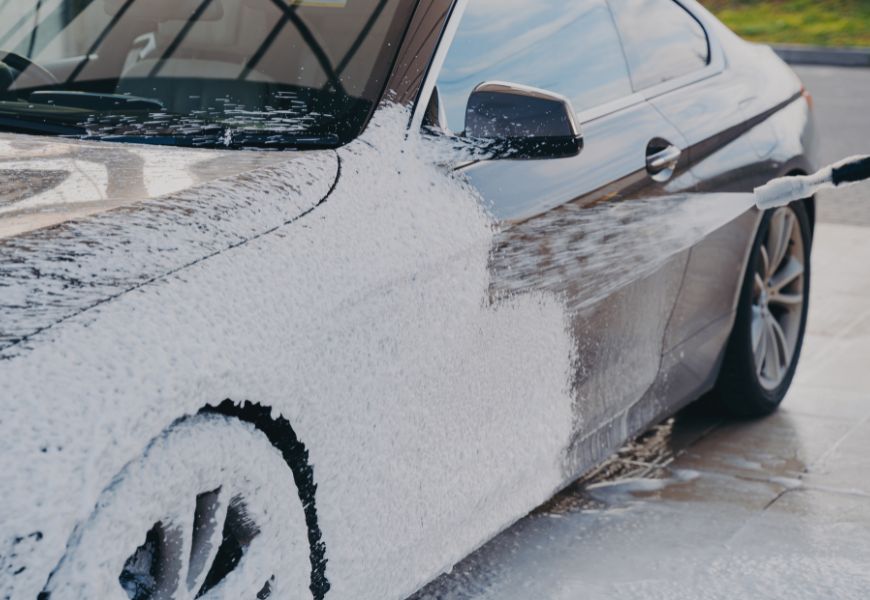
Wrapping It Up
Getting that deep, satisfying clean with your pressure washer isn’t just about owning the right tools; it’s also about knowing your soap and using it wisely. Whether you decide on a homemade mix or a commercial cleanser, understanding the difference and applying it properly makes all the difference.
We’ve armed you with everything you need to know, from choosing between DIY and store-bought soaps to application techniques that maximize your results. Remember, it’s not just about blasting away dirt; it’s about choosing the right solution for the job, applying it carefully, and using your pressure washer effectively.
FAQs
Can I use dish soap in a pressure washer?
Unfortunately, dish soap is not recommended as it can cause damage to the internal parts of the pressure washer and produce excessive foam.
Can I use any type of soap in my hot water pressure washer?
Not all soaps are safe to use in a hot water pressure washer. It’s best to use a soap designated as safe for use in hot water pressure washers to avoid any potential damage.
Will using the wrong type of soap damage my pressure washer?
Yes, using the wrong type of soap can damage your pressure washer internally. It’s important to use a soap formulated for pressure washers.
What are detergent tanks in pressure washers?
Some pressure washers have a detergent to seamlessly include detergent for deeper cleaning. Make sure to fill it with a soap that works for pressure washers.
Is every soap compatible with my pressure washer?
No, not every soap is compatible with your pressure washer. Always check the soap manufacturer’s guidelines to ensure it is safe to use in your specific machine.

